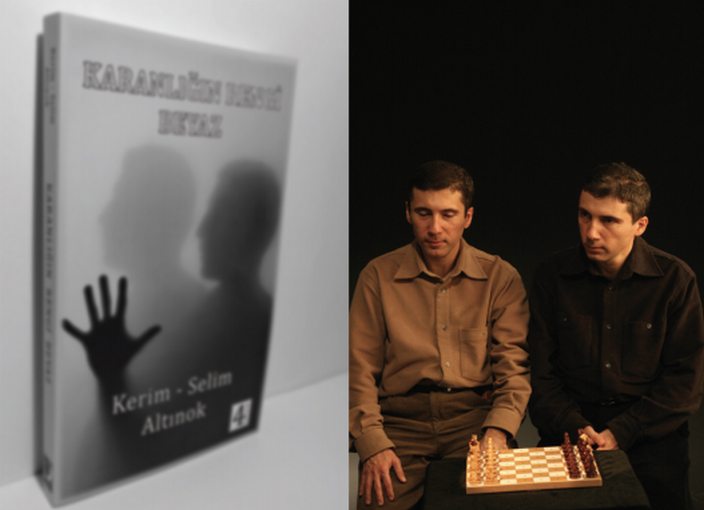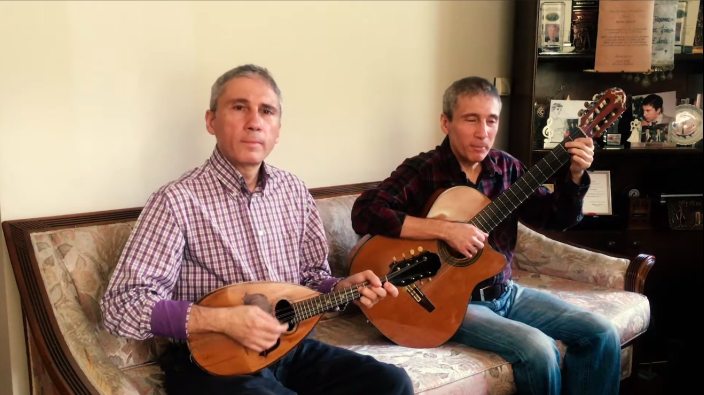In conversation with Dr. Kerim Altinok and Dr. Selim Altinok
Written by Dora Martinez (dora@lensethics.org)
Contributor: Seçkin Serpil
Photos courtesy of Kerim and Selim Altinok
Where would the color of darkness fall on Sir Isaac Newton’s color wheel? Color does not exist outside of our minds and our perception of color is certainly personal and subjective, usually shaped by our experience and even culture. But, what if — we lost our sight?
I spent most of my childhood seeing from the perspective of a child whose mother had lost her vision, interpreting my world through light, shadows, whites, greys, hues, and contrasts. The loss of vision was not my own but, that didn’t matter — in my young mind, even smells were assigned a color. Creative people like to challenge the status quo, we don’t accept the hand we are dealt. Instead, we carve a path for ourselves, shaping the world around us, one move at a time.
Meet Dr. Kerim Altinok and Dr. Selim Altinok, they are identical twins, doctors, musicians, writers, lawyers, and yes…chessplayers. Kerim and Selim are both participating in the first FIDE Online Chess Olympiad for People with Disabilities as part of a team from Turkey.
We sat down for a chat, much in the same way we are all communicating during the pandemic — with a Zoom call.

When did you both start to play chess?
We started playing chess when we were 14 years old. During a visit to our grandparents’ home, we saw a wooden chess set and we were drawn to it. Our grandfather taught us how to play and gave us a chess book. After learning and playing for 6 months, we won against our grandfather and after that, he never won again.
What do you think about playing in the first Online Chess Olympiad for People with Disabilities?
We are excited to participate in this tournament. Especially because there are many strong young players. We have been playing online for a very long time and have even created a guide for players with visual impairments on how to use the accessibility features on LiChess which is on YouTube. Playing independently is very important for us but, for this tournament, we have to play with the help of an assistant. This is not so ideal because we have to say our move, wait for the assistant and this is not so good for concentration. We hope that for the next online Chess Olympiad for People with Disabilities, Tornelo’s platform will be accessible for people with a total loss of vision. Other than that, we are very happy to be participating in the event.
You lost your vision completely at the age of 18. At that time, you had already been playing chess for 4 years. Having lost your vision gradually, did this in a way give you some time to figure out how to adapt to the changes that were coming? What were the challenges you faced in securing chess equipment as players with a visual impairment?
At 14, we started to play chess on a normal board. As our vision worsened, we tried to play chess near the window to use the natural light. Before we lost our vision completely, there was no internet, so we found a carpenter that could make a chessboard and pieces the way we wanted. This board was not so practical because it was so big. Now, we have boards that are more practical and easier to travel with. The carpenter that made the chessboard for us was blind. He has since passed away but, we have the board he made for us and he lives in our mind.
How has chess impacted your life?
Like art and mathematics, chess is like a mirror of life. In life and chess, you might have a hopeless position but, it can be changed. With chess, you can change the situation because in another game, with a good fight, you might change the result.
If chess is like life, how do you overcome wins and losses on and off the board?
After a long chess game, losing the game is not easy. But, we know that our worst games teach us a lot of things, much more than our wins. If I lose a game, I feel happy if there is a good position because I played my best.
Art can be therapeutic when dealing with the challenges in our lives. I think chess has the power to do the same. Does chess provide that for you?
There are similarities between life and chess. But, life is stronger than chess and can be a heavy burden. If I want to leave my home, there are many obstacles. When life gets challenging, playing chess provides some release from the challenges because it requires deep concentration.
You are lawyers and you advocate for the rights of people with disabilities. Can you give us an example of the work you’ve done in this field?
Making laws is good but, without education, laws are not enough. For us, education is more important because sometimes laws are not enforced. We focus on education because education has the power to touch people, and laws don’t always touch people.
Our work in education is very important to us. We have written a chess guide in braille and have created many audio chess books for the visually impaired. We would like to make these books accessible to as many visually impaired people as possible. In addition to the chess books we have written, we have also written an autobiography called, “The Color of Darkness is White”.
How did you come up with the title for your autobiography?
We had many talks about what the title should be. We decided on this name because when people think of darkness, the color that comes to mind is black. But, if we accept that darkness is black, we accept a hopeless situation. When we say that the color of darkness is white, this is our perspective on life.
Is your autobiography available in braille? Has it been translated into other languages?
Our autobiography is available in Turkish, audiobook and braille.
Was your first chess book in braille?
At that time (age 14) we still had some vision and could read print books. However, at the age of 18, when we lost all of our sight, we learned braille at a rehabilitation center for the blind. We subscribed to braille magazines from England and borrowed braille books from the library. They sent us real chess books. After that, we used the computer with a screen reader. Now, it is so easy for us to access any chess materials. We use Chessbase and other platforms.
Do you prefer open tournaments or tournaments for people with disabilities?
We definitely prefer open tournaments because we can meet all people and communicate with them.
Who is your favorite chessplayer, living or in history?
Nowadays, Anand and Carlsen. Our first chess book was from Capablanca so we consider him our first teacher, we think of him as family. – Kerim
For me, now, GM Mustafa Yılmaz and Handenur Şahin and in chess history Mikhail Botvinnik. – Selim
You are professional musicians. When did your interest in music begin?
Our interest in music began at the age of 7 when our mother gifted us a little piano. Later, we got an accordion and this was the first real instrument we received. After grade school, Serim began to study the mandolin and later studied the violin. I began to study recording and in middle school I studied classical guitar.
The violin is Serim’s first love and his favorite instrument is the mandolin. Kerim’s favorite is classical guitar. For over 30 years we have held violin and classical guitar concerts.
You mentioned that chess provides some relief from your challenges in life. Does music provide the same for you?
It can be that one day chess provides inspiration and one day music. There are many similarities between chess and music. But, with chess, we have met thousands of people and have made new friends. On the other hand, chess is a very competitive game and with music you have to compete against yourself, you have to beat yesterday’s performance. When we retire from the music we turn to chess, when we retire from chess we turn to music. With music your relationship is with an audience and with chess it is one-to-one. But, we have met so many people through chess that we feel like part of a big chess family, like the FIDE motto — Gens una sumus.
You are chessplayers, professional musicians, lawyers, writers, activists. Do any of these play a significantly stronger role in your life or do they all have equal time?
For me, education is first. After education, music, and chess together. — Kerim
For me, it is teaching. Right now, I am working on a new project, a new educational series for the blind about classical harmony. — Selim
I use some digital techniques to produce chess materials for the blind. When we were young, our father and mother helped us get access to these materials and it was harder then. Now, we can get this material in seconds and this is very helpful for players. We translated a chess anthology of combinations (encyclopedia) into audiobooks. This book had 2000 chess combinations. We have lost our parents but are very thankful for them.
Does this educational approach help you with training?
Of course. If we had two lives we still could not finish this material. But, we don’t do this for us. When we die, we want this material to be useful for thousands of people with visual impairments, we want this work to reach many.
The teaching and educational materials you create for people with disabilities are for both music and chess. Do you have a favorite musician or genre?
We prefer classical music, from the Baroque periods, Beethoven, Mozart.
I’ve heard that you give concert performances at chess tournaments. Is this true?
We bring our instruments to all of the chess tournaments we go to. We have given concerts in the cafe and the grandmasters provide game analysis. It is like making a trade — a concert performance in exchange for game analysis. Also, before the pandemic, we wrote a musical for theater. But, because of Covid-19, it only lasted one season. The musical is about our lives. Link to the musical teaser: https://youtu.be/RY3I-qLMjPA
Could you play a piece for us as a farewell?

Dr. Kerim Altinok and Dr. Selim Altinok play “Like a Tree”: https://youtu.be/0UfQyEGE1zE







